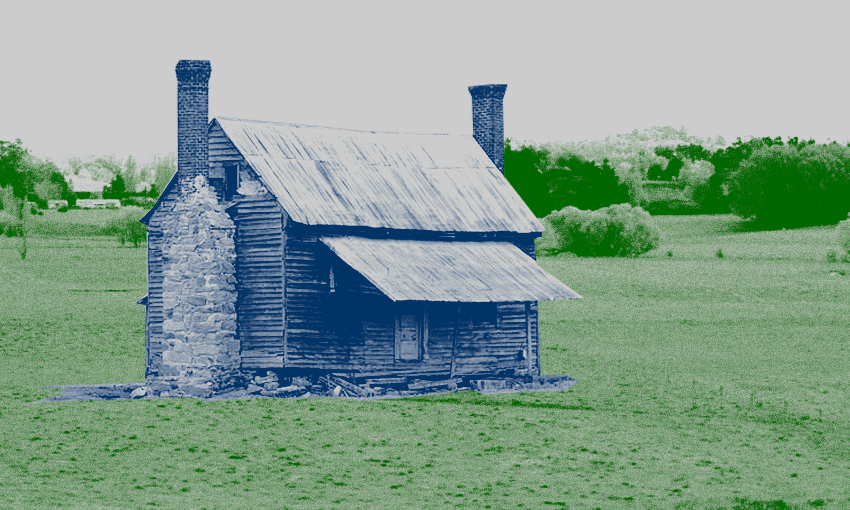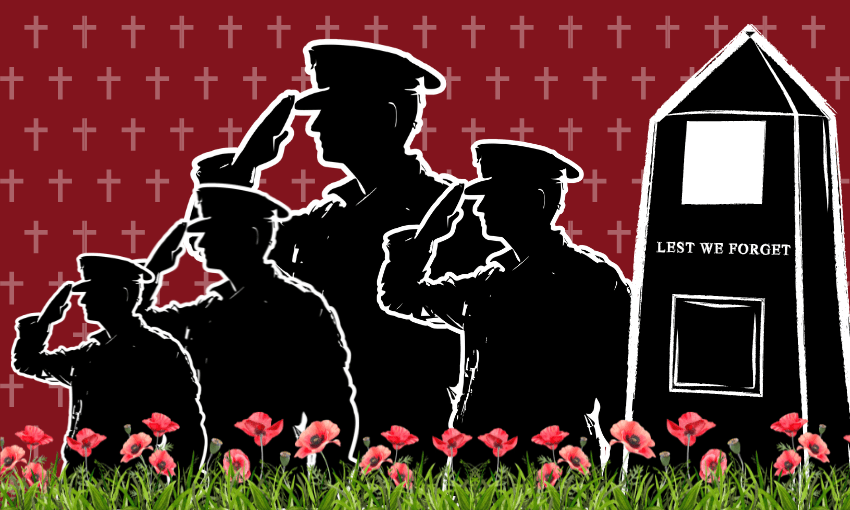Summer reissue: David Hill remembers an old friend, who you’ve probably never heard of.
The Spinoff needs to double the number of paying members we have to continue telling these kinds of stories. Please read our open letter and sign up to be a member today.
Doug (I’ll call him that) died in March. You won’t know him.
How do you measure the significance of a life? If you go for public profile, legacy of work, dramatic deeds, seminal ideas or discoveries, then Doug seems to sit well towards the Insignificant end of the spectrum. And yet…
I first knew him decades back, at our boys’ high school: a powerful young rugby player and competent-plus student. He was genial, sociable, easy in his own body. At regimented dances with the local girls’ high, figures in stiff petticoats and ponytails gravitated to him, while I glowered from a corner, skinny and spotty and sullen.
In our small, final-year class, we were thrown together. And Doug was friendly. Genuinely friendly, with the focus that means you’re being registered, being acknowledged as an individual.
He helped me bloom. What a… florid phrase. Yet, to have this proto-Apollo from a little farming town, this 1st XV captain and deputy head boy say “You’re bloody great with words, Dave. Wish I could do stuff like that”, helped me stand a bit taller, believe there could be a future beyond awkward, acned adolescence.
Then we left school, and I never saw him again for 55 years.
I remade contact because our high school began sending me Old Boys’ newsletters. Maybe they were hoping for endowments (from a writer??). One newsletter included names and last-known addresses for pupils from my decade. Beside the names was a column with ticks scattered down it, and the heading DEC – as in Deceased. A number of my peers were dead.
It jolted me. So over the next weeks I emailed or wrote to some of the unticked. “Saw your name… just want to say I remember you… hope you’ve had a good life… All the Best.”
Replies ranged from pleased to wary. One of the former was from Doug, a hand-written letter on lined notepaper. Bloody brilliant to hear from me; he was on the family farm, been there for ever; next time I was anywhere near…
Three months later, I was. A tiny rural town. Weatherboard houses alternating with paddocks. I stopped outside a big old place backed by fruit trees and bush. An XXOS garage held car, trailer, quad bike. A pair of working gumboots stood by the front door.
That door opened, and I was startled. The figure grinning at me was stooped and seamed. The hand that gripped mine was hard but strangely tentative. (He’d broken a coupla fingers when a fence-strainer jammed once; couldn’t be bothered seeing a quack.) The voice was a smoker’s rasp. “Shit, you’re taller than I remember.”
His partner June was out at her part-time local council job, “knockin’ some sense into the buggers”. She’d told Doug to look after me properly, so he brought through a plate of her muffins; brewed two mugs of bituminous coffee.
Talk came easily. Bloody brilliant idea of mine to make contact. He reminisced about some of the newsletter names, the teachers we’d had. He’d always meant to go to a reunion; never got round to it.
He smoked all the time: skinny, noxious roll-your-owns. He didn’t ask if I minded; that wasn’t relevant. This was his domain, and he was paying me a compliment by acting like he usually did. He coughed occasionally; laughed with a background wheeze.
He took me outside to see his orchard. Plums, peaches, nectarines, pears. Most of the trees were younger than him; after all, he’d been here for 55 years.
He told me about it as we strolled. “Been plannin’ to do Ag Science at Massey. Then the old man got crook; I came home to help him; never left.” He’d married a local girl, who died a fair while back; he didn’t say any more about that.
He was happy. I saw that almost instantly. And fulfilled. Five-plus decades in this little town, and he was replete with friends, activities, issues. His son-in-law ran most of the farm now. Doug gave him a hand sometimes (translation: told him what he should be doing). He didn’t boast, but contentment lay beneath all he said. He touched his trees as we walked; pointed at distant hills where he used to hunt till his useless bloody knee gave out. Four… five cars or trucks passed while we were outside; all of them tooted.
He wanted to know what I’d done; grinned when I told him about my wife Beth. “She’s a gun with words, too, eh? Good on yer.”
The Great World didn’t interest him much. It was vapour trails in the sky – remote and evanescent. But local as in village politics engrossed him. “Take ya down the pub, next time ya come. It’s a bloody debating society down there.”
June came home, neat and grey-haired, found us in the gargantuan vegetable patch, where Doug was prodding an aubergine. “Like to try somethin’ new each year.” She checked I wasn’t condescending to him, hugged me when I left, laden with sweetcorn and broccoli. I drove away smiling.
Beth and I saw them three or four times over the next few years. She liked his utter lack of affectation, his pleasure in our visits. (“Y’made my day.”) She even managed half a cup of his coffee when June wasn’t there one time.
I mustn’t sentimentalise him. Local bodies and government departments brought out his inner redneck. “I gave the buggers an earful and walked out” was a phrase I heard too often. Left-wing parties needed a kick up the arse – meanwhile, he was being a de facto union advocate for a sharemilker getting a raw deal. The Greens? “Don’t get me started on those pricks.” One of his several iterations of this came as we walked the stand of native trees he’d planted to replace a grazing paddock. I never could think of a reply.
He hadn’t been out of New Zealand, hadn’t been out of the North Island, I suspect. But then, Jane Austen’s Emma had never seen the sea, and Austen’s “families in a country village” were enough to keep Doug full and rewarded as well.
He was Ngāti Pākehā, yet had become a district kaumātua. Artefacts and taonga were brought to him for advice or safekeeping. Whānau, even iwi disputes had been settled in his living room. He didn’t say this; I heard it from June. He had little te reo (“English is bloody hard enough”), but he knew the whakapapa of everyone nearby. Troubled tamariki sometimes worked on his farm, learned skills, got a boot up the bum – his terminology again – if they slacked.
He was delivering a load of his fruit and veges to a family one day. I went along for the ride. Just outside town, we turned into a road of poplars and magpies, via a clattery wooden bridge. “Planted a few trees back there,” Doug said, nodding at what looked like 100m of flourishing riparian greenery.
Ahead of us, a Māori man was checking his mailbox. Doug slowed, yelled “G’day, ya black bastard!” This is interesting, I thought; I’m going to die by a rural roadside. The other party grinned, and replied “Hey, honky!”
He never did get me down to the pub. A mutual friend had told me of Doug’s consumption, and the times he’d lost his licence, or the local cop had given him yet another warning.
When the pub and those roll-your-owns finally caught up with him, it wasn’t an easy dying. His leathery body resisted hard, till the final weeks seemed to bring their own quiet and analgesic.
I couldn’t get to the funeral. Ironically (I hear Doug’s wheezy laugh), our own health issues prevented it. But that mutual friend told me how the church was thronged, how dozens stood outside. Waiata were sung; a korowai draped his coffin as it was carried through the gate to burial beside a big macrocarpa. “A lot of guys were crying,” said our friend on the phone, before choking up himself.
Doug got no media obituary. If there had been any, I suspect he’d have asked “What the fuck for?” Hardly anyone outside his community knew him. Everyone inside that community did.
A limited life? By most criteria. Not by his, and I never doubted that fulfilment, that contentment I’ve mentioned. “He’s a happy man,” Beth said once, and she (of course, dear) was right. My heart lifted each time I made the turn-off into his little settlement. Did he do the William Blake thing and see heaven in a wild flower? He’d more likely have rooted the cheeky bugger out, especially if it was in among his aubergines.
He gave us a dwarf kōwhai one time. I see it each time I go out our back door. Yes, it makes me remember Doug. It also reminds me that I never found a riposte to his insults against the Greens.
First published May 18, 2024


